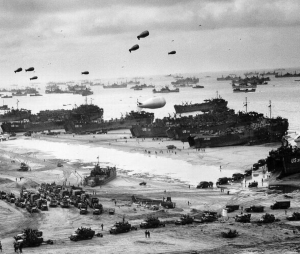When was D-Day? On June 6, 1944, the momentous event known as D-Day took place. This historic day marked a crucial turning point in World War II as Allied forces launched a large-scale invasion on the beaches of Normandy, France.

It occurred on June 6, 1944. On this significant day, the Allied forces, led by the United States, United Kingdom, and Canada, executed a coordinated assault on German-occupied France. D-Day involved airborne operations, naval bombardments, and the landing of troops on the heavily fortified beaches of Omaha, Utah, Gold, Juno, and Sword.
D-Day holds immense historical significance. Taking place on June 6, 1944, this pivotal operation opened a crucial Western front against German forces during World War II. The date itself represents a turning point in history. The invasion of Normandy allowed the Allies to establish a vital foothold and launch a campaign to liberate Europe from Nazi control. With meticulous planning and execution, the bravery and sacrifice of soldiers on both sides cannot be understated.
On June 6, 1944, the Allied forces initiated a daring and audacious invasion that reshaped the course of the war. The significance of D-Day lies in its pivotal role in enabling the ultimate defeat of the Axis powers. By securing a foothold in Normandy, the Allies established a vital supply line, leading to the liberation of France and Europe from Nazi occupation. The heroism displayed by the soldiers on D-Day serves as a testament to their unwavering dedication to freedom and justice.
D-Day, which occurred on June 6, 1944, stands as a testament to bravery, sacrifice, and collaboration. This momentous event will forever be remembered as a symbol of courage and determination in the face of adversity.
This historic event, which played a crucial role in World War II, showcases the unwavering determination and sacrifices made by Allied forces. D-Day stands as a testament to their resolve in liberating Europe and shaping the course of the war against Nazi aggression.
Cite This Article
"When Was D-Day? Understanding Its Significance" History on the Net© 2000-2024, Salem Media.
April 28, 2024 <https://www.historyonthenet.com/when-was-d-day-understanding-its-significance>
More Citation Information.





